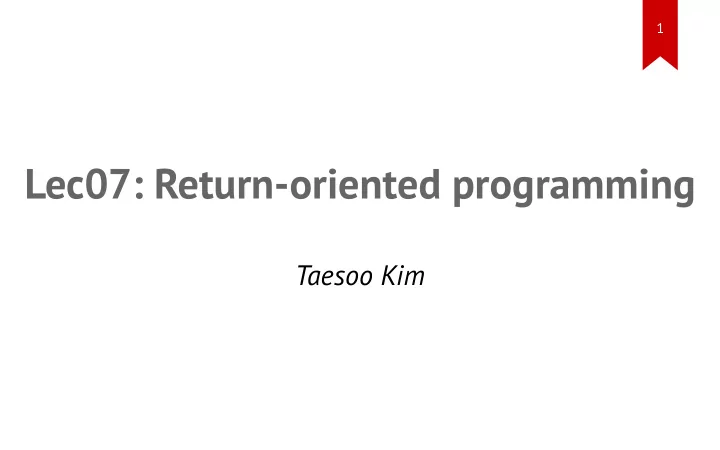

1 Lec07: Return-oriented programming Taesoo Kim
2 Scoreboard
3 NSA Codebreaker Challenges
4 Administrivia • Please submit both 'working exploit' and write-up on time; otherwise, no score. • Due: Lab07 is out and its due on Oct 19 (two weeks)! • NSA Codebreaker Challenge → Due: Nov 30 • Oct 13 : A special talk from NSA
5 Lab06: DEP and ASLR
6 Best Write-ups for Lab06 • libbase: carterchen, shudak3 • moving-target: carterchen, markwis • fmtstr-read: brian_edmonds, shudak3 • fmtstr-write: poning, carterchen • fmtstr-digging: N/A, N/A • brainfxxk: jli850, rohandvora • fd-const: prengasamy6, nagendra • fmtstr-heap: carterchen, N/A • profile: myao42, carterchen • mini-sudo: markwis, carterchen
7 Discussion: Lab06 • What's the most "annoying" bug or challenge? • What's the most "interesting" bug or challenge? • So, DEP and ASLR are not so effective?
8 Discussion: libbase • What do you learn from ./check? $ ./check stack : 0xff930aa0 system(): 0xf7521c50 printf(): 0xf7536670 $ ./check stack : 0xff930250 system(): 0xf755dc50 printf(): 0xf7572670
9 Discussion: libbase
10 Discussion: moving-target • What's "check-aslr.sh" and pie.c? • How many times should we try to exploit?
11 Discussion: moving-target
12 Discussion: fmtstr-read
13 Discussion: fmtstr-write
14 How to Prevent fmtstr-*?
15 How to Prevent fmtstr-*? • set a max on width (e.g., "%.512x" in XP, "%.622496x" in 2000) • no direct argument access (i.e., "%N$") • static (ro) format string • proposal: push N (#argument) in varargs? • check all Ns (not skip) $ ./fortify "%2\$d" *** invalid %N$ use detected ***
16 Discussion: brainfxxk
17 Discussion: brainfxxk
18 Discussion: fd-const • What's the bug?
19 Discussion: profile • What's program about? • What's the bug?
20 Discussion: profile void edit_all() { struct profile p; printf("[*] Edit all attributes\n"); p.name = get_name(); p.birthday = get_birthday(); get_phone_number(p.phone_number); p.censored = get_censored(); if (!p.censored) p.print = print_phone_number; memcpy(&my, &p, sizeof(p)); }
21 Discussion: profile bool get_censored() { char buf[SIZE]; printf("[*] Censored? (y/n)\n"); while (true) { stripped_read(buf, sizeof(buf)); if (buf[0] == 'y') return true; else if (buf[0] == 'n') return false; else printf("y/n\n"); } }
22 Discussion: profile void print_profile() { printf("========== My profile ==========\n"); printf("Name : %s\n", my.name); printf("Birthday : %d-%d-%d\n", my.birthday.year, my.birthday.month, my.birthday.day); if (my.censored) printf("Phone number : CENSORED\n"); else my.print(my.phone_number); printf("=================================\n"); }
23 Discussion: mini-sudo (CVE-2012-0809) • What is ' -D9' for?
24 Discussion: mini-sudo (CVE-2012-0809) void sudo_debug(int level, const char *fmt, ...) { va_list ap; char *fmt2; if (level > debug_level) return; /* Backet fmt with program name and a newline to make it a single write */ easprintf(&fmt2, "%s: %s\n", getprogname(), fmt); va_start(ap, fmt); vfprintf(stderr, fmt2, ap); va_end(ap); efree(fmt2); }
25 Take-outs from DEP/ASLR? • Do you think DEP/ASLR make your life more difficult? • Is still possible to exploit? why? • Although we can't place shellcode into stack/heap, we can still hijack the control flow of a program in many interesting ways
26 Discussion: Modern Exploit on ASLR (PIE) • Leak (or infer) code pointers (so map into library or code) • Construct ROP (today's topic) • (although there are a few proposals, such as CFI, to mitigate ROPs)
27 Today's Tutorial • In-class tutorial: • Ret-to-libc • Code pointer leakage / gadget finding • First ROP!
28 Reminder: crackme0x00 void start() { printf("IOLI Crackme Level 0x00\n"); printf("Password:"); char buf[32]; memset(buf, 0, sizeof(buf)); read(0, buf, 256); if (!strcmp(buf, "250382")) printf("Password OK :)\n"); else printf("Invalid Password!\n"); }
29 Reminder: crackme0x00 int main(int argc, char *argv[]) { setvbuf(stdout, NULL, _IONBF, 0); setvbuf(stdin, NULL, _IONBF, 0); void *self = dlopen(NULL, RTLD_NOW); printf("stack : %p\n", &argc); printf("system(): %p\n", dlsym(self, "system")); printf("printf(): %p\n", dlsym(self, "printf")); start(); return 0; }
30 Ret-to-libc: printf [buf ] [.....] [ra ] -> printf [dummy] [arg1 ] -> "Password OK :)"
31 Ret-to-libc: system [buf ] [.....] [ra ] -> system [dummy] [arg1 ] -> "/bin/sh"
32 Chaining Two Function Calls printf("Password OK:)") system("/bin/sh")
33 Chaining Two Function Calls [buf ] [..... ] [old-ra ] -> 1) printf [ra ] -------------------> 2) system [old-arg1 ] -> 1) "Password OK :)" [arg1 ] -> "/bin/sh"
34 Chaining N Function Calls [buf ] [..... ] [old-ra ] -> 1) printf [ra ] -------------------> pop/ret gadget [old-arg1 ] -> 1) "Password OK :)" [ra ] -> 2) system [ra ] -------------------> pop/ret gadget [arg1 ] -> "/bin/sh" [ra ] ...
35 Tutorial Goal: Chaining Three Calls printf("Password OK:)") system("/bin/sh") exit(0)
36 In-class Tutorial • Step1: Ret-to-libc • Step2: Understanding module base • Step3: First ROP $ ssh YOURID@cyclonus.gtisc.gatech.edu -p 2023 $ ssh YOURID@cyclonus.gtisc.gatech.edu -p 2022 $ ssh YOURID@computron.gtisc.gatech.edu -p 2023 $ ssh YOURID@computron.gtisc.gatech.edu -p 2022 $ cd tut/lab07 $ cat README
37 References • ROP
Recommend
More recommend